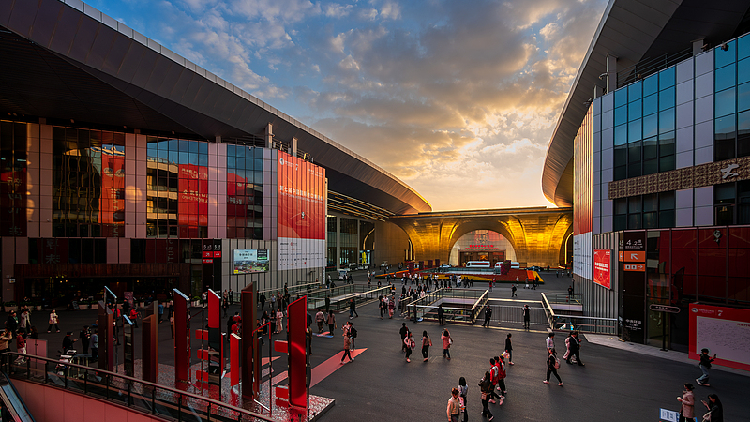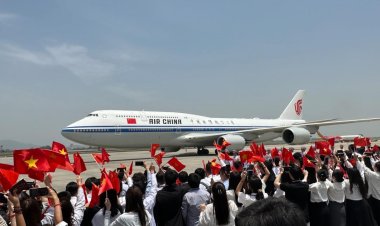Hongqiao CBD's Growth in Shanghai Bolstered by CIIE's Impact
In 2009, Shanghai unveiled its intentions to develop the Hongqiao Central Business District (CBD) focused on a transportation hub, officially renaming it the Shanghai Hongqiao International Central Business District in August 2021. The China International Import Expo (CIIE) has played a pivotal role in the rapid development of Hongqiao CBD. Concurrently, the CBD's objective is to amplify the impact of the CIIE by introducing initiatives that simplify services for professionals in commerce and trade, thoroughly improving its service ecosystem, and further energizing the regional economy.

In 2009, Shanghai unveiled plans to establish the Hongqiao CBD, designed around a transportation hub, and officially rebranded it as the Shanghai Hongqiao International Central Business District in August 2021. Thriving under the impetus of the China International Import Expo (CIIE), Hongqiao CBD has made remarkable progress, aiming to further amplify the influence of the CIIE by optimizing services for commerce and trade talent, enhancing its service ecosystem, and invigorating the regional economy.
Over the past three years, the import and export volume within the Hongqiao International CBD surged from 24.13 billion yuan to 75.93 billion yuan, signaling substantial growth in trade activities. Notably, the region's cross-border e-commerce sector has excelled, with the Hongqiao CBD Bonded Logistics Center being the highest-ranked center in the city for both cross-border e-commerce orders and sales. Leveraging the CIIE platform, Shanghai Hongqiao International CBD is positioning itself as a key distribution hub for imports and exports, effectively linking the Yangtze River Delta, nationwide markets, and extending its reach across the Asia-Pacific region. In pursuit of developing a prominent area for the "Silk Road E-commerce" initiative, the CBD has established a "Silk Road E-commerce" digital technology application center and a new international trade platform.
To harness the benefits stemming from the CIIE's spillover effects, Hongqiao International CBD is capitalizing on its unique advantages by setting up a dedicated cross-border e-commerce service window for Shanghai Port. The initiative encourages leading digital enterprises in the district to form a digital trade industry alliance and establishes a cross-border data service center. Building on this foundation, efforts are underway to create a headquarters cluster for enterprises in the Yangtze River Delta that specializes in service trade, digital trade, and offshore trade, continually extending the industrial chain and deepening the sectoral landscape. These strategies significantly bolster the CBD's corporate environment and service ecosystem, enhancing economic vitality and facilitating more integrated and international development in both the surrounding area and the overall Yangtze River Delta.
To further increase the impact of the CIIE, Hongqiao International CBD is launching initiatives designed to enhance talent services in commerce and trade, highlighting several key aspects:
First, the emphasis on the crucial role of enterprises in attracting talent will be strengthened. The CBD aims to enhance recommendations for key firms in talent acquisition by including qualified top-tier companies on Shanghai’s list of key institutions for talent attraction. These firms will gain increased autonomy in recruiting talents and receive additional household registration quotas through household registration policies tailored for special talents. This approach leverages the advantages of high-quality enterprises to drive the recruitment of professional talents.
Second, the focus on talent projects as a means of attraction will be prioritized. The CBD plans to further develop a talent pool within the commerce and trade sector, supporting candidates in applying for programs under the Eastern Talent Plan, including both leading talent and youth talent initiatives. By creating diverse talent projects, the district intends to offer competitive incentives to outstanding individuals, increasing its attractiveness to top-quality talent while maintaining stringent selection standards to ensure only the most exceptional candidates are drawn to the area.
Third, the importance of fostering international talent development has been underscored. Utilizing the Hongqiao International Talent Service Center, the CBD will enhance support for the international mobility of talents. This support includes facilitating endorsements for travel to and from the Hong Kong and Macao SARs for senior corporate managers and qualified talents as well as providing streamlined services related to visas, residency, work, and everyday life for international professionals. These initiatives aim to reduce barriers for international talents entering China, facilitate cross-border communications, and enhance the CBD's appeal.
Beyond enhancing talent services, policies in areas such as investment promotion, financial support, and innovation support are being considered to further accelerate the CBD's development.
In terms of investment, there is a push for more diversified and international capital inflow into the CBD. This could involve easing restrictions on foreign investment, establishing a zero-threshold entry for foreign players, and encouraging prominent multinational companies to establish wholly-owned subsidiaries and research and development centers within the CBD. Additionally, efforts will target the attraction of entirely foreign-owned hospitals and mixed public-private foreign offerings to broaden investment varieties in the area.
On the financial side, expanding financial openness and facilitating fund flow will be crucial. Support for cross-border trade financing and refinancing in renminbi, along with cross-border investment and financing services for local businesses, may be enhanced. Additionally, an integrated pool for local and foreign currency may be developed to grant businesses greater autonomy in foreign exchange transactions.
Regarding support for technology and innovation, there is a strong need to bolster growth and enhance capabilities within high-tech enterprises. This could involve encouraging universities and research institutes to establish R&D centers for technology and innovation within the CBD and to initiate functional research headquarters and innovation consortia. Furthermore, a dedicated investment fund for technological innovation in the Yangtze River Delta could be founded to support early-stage and high-growth companies, thereby nurturing potential future tech unicorns.
Through a blend of these measures, the Hongqiao International CBD can effectively harness and amplify the influences and spillover effects of the CIIE, while fully leveraging its unique strengths and initiatives to explore development paths suited to its distinct characteristics. With ongoing innovation, it has the potential to evolve into a premier global hub characterized by high-end resource allocation, thereby driving high-standard opening up and quality development across Shanghai and the broader Yangtze River Delta region.
Thomas Evans for TROIB News
Find more stories on Business, Economy and Finance in TROIB business












